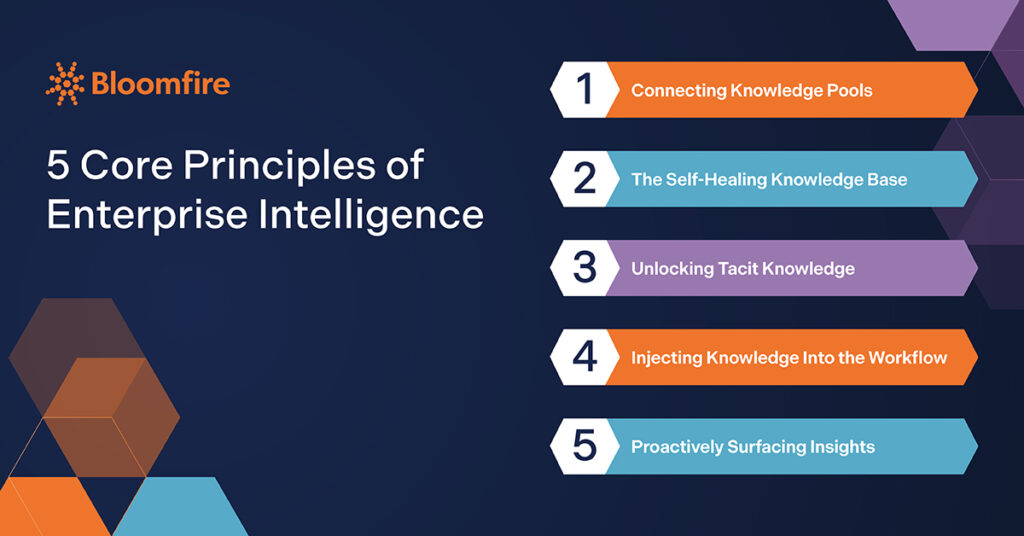The Guiding Principles of Enterprise Intelligence to Drive Competitive Advantage Through Knowledge

In today’s volatile economy, CEOs and CIOs are under pressure to do more with less—faster decisions, smarter operations, and scalable innovation. Yet most companies’ knowledge is fragmented, static, and underutilized.
That’s where Enterprise Intelligence comes in: a strategic framework for turning organizational knowledge into measurable business outcomes. But doing this well requires more than a new tool or dashboard. It requires a new way of thinking about how knowledge works across your organization. These core principles of Enterprise Intelligence move us beyond passive systems and toward real-time knowledge activation, empowering people and processes alike.
And it’s not just theory. Bloomfire’s recent Value of Enterprise Intelligence study, which surveyed over 10,000 employees across 115 companies, shows that organizations implementing strong knowledge practices see a 59% reduction in barriers to accessing critical information.
Let’s explore the five principles that define Enterprise Intelligence, and why they matter now more than ever.
5 Core Principles of Enterprise Intelligence
Enterprise Intelligence isn’t just a framework but a response to what employees and organizations need most. A staggering 98.5% of employees believe they could be more effective if knowledge were better shared across departments, an overwhelming signal that organizations are missing out on untapped potential. These core principles are designed to address those realities head-on. They are closely tied to the broader benefits of Enterprise Intelligence that organizations are beginning to quantify across every business function.
These principles aren’t abstract; they’re designed to solve these exact pain points and turn knowledge into a proactive, real-time driver of business performance.

1. Connecting Knowledge Pools
Most organizations are drowning in knowledge scattered across platforms: cloud drives, CRMs, ticketing systems, Slack threads, SharePoint folders, and the minds of employees. Enterprise Intelligence solves this fragmentation by connecting all your structured and unstructured knowledge, no matter where it lives.
When insights flow freely across systems and teams, your organization can operate as one connected intelligence network instead of siloed departments. That belief is measurable: 46% say their days would be significantly more productive with better access to cross-functional information.
By connecting these systems, Enterprise Intelligence enables real-time knowledge sharing that drives alignment, speeds collaboration, and reduces duplicated effort.
2. The Self-Healing Knowledge Base
At the heart of Enterprise Intelligence is a self-healing system, a knowledge base that continuously improves itself. Unlike traditional repositories that depend on manual updates, a self-healing knowledge base identifies gaps, flags outdated or conflicting information, and automatically removes redundant or trivial content.
This is critical in a fast-changing business environment. The cost of making decisions based on outdated knowledge is steep: missed opportunities, lost productivity, and reputational risk. A self-healing system ensures your real-time knowledge foundation remains clean, current, and trustworthy.
It also directly impacts team performance. Our research shows that organizations prioritizing active knowledge maintenance see a 12% increase in team efficiency and tangible improvements in day-to-day operations.
3. Unlocking Tacit Knowledge
One of the most overlooked sources of value in any business is tacit knowledge—the unspoken expertise that lives in your employees’ heads. This includes everything from a product manager’s historical context to a service rep’s intuition on handling complex cases.
Enterprise Intelligence acknowledges that real-time insights aren’t only found in files, they come from people. That’s why one of its core principles is enabling the capture, facilitation, and institutionalization of tacit knowledge before it walks out the door.
Companies that activate this knowledge see measurable returns. Our report found that 10% of organizations focused on surfacing employee expertise experience improvements in collaboration, and 5% experience increased customer retention. Those gains become especially important during periods of high turnover or organizational change.
4. Injecting Knowledge Into the Flow of Work
Knowledge doesn’t create value sitting on a shelf. It needs to show up when and where decisions are being made—inside workflows, tools, and conversations.
That’s why Enterprise Intelligence is designed to inject real-time knowledge directly into the platforms your teams already use, whether it’s Salesforce, Microsoft Teams, Slack, or a customer support interface. This removes friction from the process and reduces the need to context-switch or dig through repositories.
When knowledge is embedded in the flow of work, it accelerates execution, shortens onboarding, and supports confident decision-making at every level. In fact, 46% of employees in our study said their productivity would significantly improve if knowledge flowed more freely across the organization.
5. Proactively Surfacing Insights
Too often, employees are expected to find what they need, digging through folders, pinging colleagues, or Googling internally. It’s inefficient and leads to missed insights and slow decisions.
A defining feature of Enterprise Intelligence is its ability to proactively deliver real-time insights to the right people at the right time. Using AI and usage patterns, it understands context and pushes relevant knowledge forward, before someone even knows they need it.
This is more than just search; it delivers results: 80% of employees say that access to knowledge has improved their decision-making, with 35% reporting a significant improvement in just six months.
Why These Principles Matter Now
We’re in a moment of rapid transformation. AI is reshaping how people interact with technology, how customers expect to be served, and how businesses respond to change. In this environment, the companies that succeed won’t just be the ones with the most data—they’ll have the most real-time knowledge flowing across their enterprise.
That’s the promise of Enterprise Intelligence.
It’s a strategic framework that applies these five principles to transform how people work and companies perform. And the business value is clear. Our research found that organizations effectively leveraging Enterprise Intelligence gain an estimated $27.1 million per 100 employees in productivity improvements and over $2.26 million in cost avoidance, results that scale significantly across large enterprises.
What Is an Intelligent Enterprise?
An intelligent enterprise is one that continuously learns, adapts, and optimizes how it operates based on its collective knowledge. It is agile, informed, and powered by real-time insights.
Enterprise Intelligence provides the foundation to become that enterprise. It ensures that knowledge is no longer locked in silos, buried in archives, or lost in email threads. Instead, it becomes a dynamic, constantly improving force that drives strategy and execution.
So, what sets Enterprise Intelligence apart? Its principles make intelligence actionable, knowledge shareable, and impact scalable.
Turning Insight into Enterprise Value
The organizations that will define the next decade aren’t just those that collect the most data; they’re the ones that operationalize it with speed, precision, and purpose. While traditional knowledge management has helped lay the groundwork, Enterprise Intelligence reimagines what’s possible when insights are made actionable, real-time, and embedded into the fabric of work.
Unlock Enterprise Intelligence
See how companies are quantifying the results of real-time knowledge activation.
Learn More

How Knowledge Management Enhances the Decision-Making Process of Organizations

How You Can Use Knowledge Management to Finally Achieve Operational Excellence

Knowledge Management History: Why Businesses Took 50 Years to Adopt It

Estimate the Value of Your Knowledge Assets
Use this calculator to see how enterprise intelligence can impact your bottom line. Choose areas of focus, and see tailored calculations that will give you a tangible ROI.

Take a self guided Tour
See Bloomfire in action across several potential configurations. Imagine the potential of your team when they stop searching and start finding critical knowledge.
